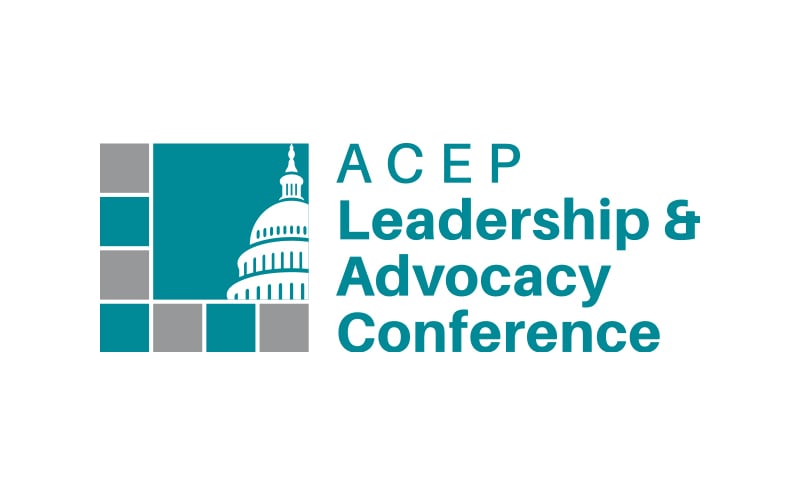
Workforce Section 2021 LAC Report
ACEP Leadership and Advocacy meeting in 2019 had over 500 attendees. It was cancelled in 2020 due to the Coronavirus. This year the meeting was held in person at the Hyatt Regency in Washington, DC July 26 and 27, 2021. There were approximately 250 attendees and 50 persons participating virtually.
The Hyatt Regency is a recently renovated hotel in downtown Washington. It is a ten-minute walk from the mall, the Washington Monument and the Lincoln Memorial.
Discussions/presentations began Monday morning with a panel discussion regarding initiating buprenorphine in the emergency department for individuals with opioid use disorder. It is estimated that 93,000 individuals died due to opioid overdoses in 2020. This is an increase over previous years. One of the barriers is that to prescribe buprenorphine the provider must have an X waiver from the Drug Enforcement Agency. As well, there are limitations with respect to how much medication may be prescribed and how many patients may have prescriptions written. Please see one of the bills we discussed with legislators on Tuesday.
There was then a presentation regarding human trafficking. 80% of individuals that are being trafficked have encounters in a medical setting. 50% of the individuals are male. There was discussion regarding recognizing these victims and how to respond. This can be tricky because often these individuals have had encounters with local law enforcement for prostitution, illegal substances and/or soliciting. The National Human Trafficking Hotline is 1-888-373-7888.
This was followed by a discussion regarding where we are going with telemedicine. It is clear that telemedicine is here to stay, and payors are being encouraged to continue reimbursement. Expanding telemedicine may clearly play a role with respect to specialty access in the rural setting. As well, there was a presentation where ABEM-certified physicians virtually cover rural EDs (staffed by advanced practice providers). This includes the fiberoptic laryngoscope images being available to the covering physician. Discussion ensued regarding incorporating telehealth into training programs.
There was a forum regarding the EM workforce, moderated by ACEP President Mark Rosenberg, DO, MBA, FACEP. In 1991 there were 625 EM graduates; this has increased to 2890 in 2021. Some models estimate there may be more EM graduates than jobs in the future. As well, the role of advanced practice providers (AAPs) in emergency medicine was discussed and how to encourage residency trained and ABEM certified physicians to practice in the rural setting.
This was followed by a panel discussion regarding improving health equity through the emergency department moderated by ACEP Board member Aisha Liferidge, MD, FACEP. Members of the panel included the council for the House Ways and Means Health Subcommittee and physician Representative Bill Cassidy (R-LA). There is no question that COVID-19 has revealed significant health care disparities in the United States. This has come to the attention of our elected officials, and they are working to develop policies in an effort to address and correct. As well, implicit and unconscious bias in clinical practice was discussed.
The final discussion was regarding Medicare reimbursement. This folds into one of the three issues we discussed with Senators, Representatives and their health care staffers (virtually) the following day. There are three separate reductions in Medicare physician reimbursement due to take place 1/1/2022.
Medicare sequestration 2% cut. Since 2013 Medicare physician reimbursement has been subject to automatic annual sequestration cuts of 2%. During the pandemic there was a temporary reprieve which will end 1/1/22.
PAYGO Sequestration Cuts. Due to Pay-As-You-Go budget control requirements triggered by the cost of the American Rescue Plan Act passed earlier this year, emergency physicians will face an additional 4% cut to Medicare payments beginning 1/1/2022.
Physician Fee Schedule and “Budget Neutrality”. CMS 2021 Physician Fee Schedule finalized a cumulative 6% cut to emergency medicine reimbursement. Congress provided critical relief through the Consolidated Appropriations Act of 2021 offsetting all but 3.75% of the cut. This is temporary and Congress will need to act prior to 1/1/2022 to prevent a 3.75% reduction in EM physician reimbursement.
The second day of LAC we had virtual discussions with Senator’s health care staffers, Representatives and Representative’s health care staffers discussing the Medicare Payment Cliffs and two sets of bills.
Senate bill 610/House bill 1667. Dr. Lorna Breen Health Care Provider Protection Act. Named after an EM physician who died by suicide in April 2020 following weeks of caring for COVID-19 patients in New York City. These bills establish grants for training health professional students, residents, or health care professionals in strategies to reduce and prevent suicide, burnout, and mental health conditions. They seek to identify and disseminate evidence-informed best practices for reducing and preventing suicide and burnout among health care professionals. They establish a national evidence-based education and awareness campaign targeting health care professionals to encourage them to seek support and treatment. The bills establish grants for employee education, peer-support programming, and mental and behavioral health treatment for health care providers. Finally, they commission a federal study looking into health care professional mental health and burnout.
Senate bill 445/House bill 1384. Mainstreaming Addiction Treatment Act. These bills remove the requirement that a health care practitioner must apply for a separate waiver through the DEA to dispense certain narcotic drugs (including buprenorphine) in Schedule III, IV and V of the Controlled Substances Act for maintenance or detoxification treatment.
Overall, 324 emergency medicine physicians from 44 states participated in 273 virtual meetings with federal legislators and/or their healthcare staff.
I participated with the Tennessee delegation sharing these concerns and bills with our Senator’s and Representative’s health care staffers. Everyone was aware of the Medicare cuts and indicated they intended to follow developments regarding addressing the reductions in physician reimbursement. One of our representatives and two representative’s health care staffers indicated they may consider cosponsoring S 610/HR 1667.
ACEP political consultants say the most influential constituents are the ones that show up in their representative’s office and share their opinions. I find this conference interesting and educational. As well, I feel it is important to push legislation which is in our and our patient’s best interest. ACEP Leadership and Advocacy Conference next year will be May 1-4, 2022.
Thom R. Mitchell, MD, FACEP


